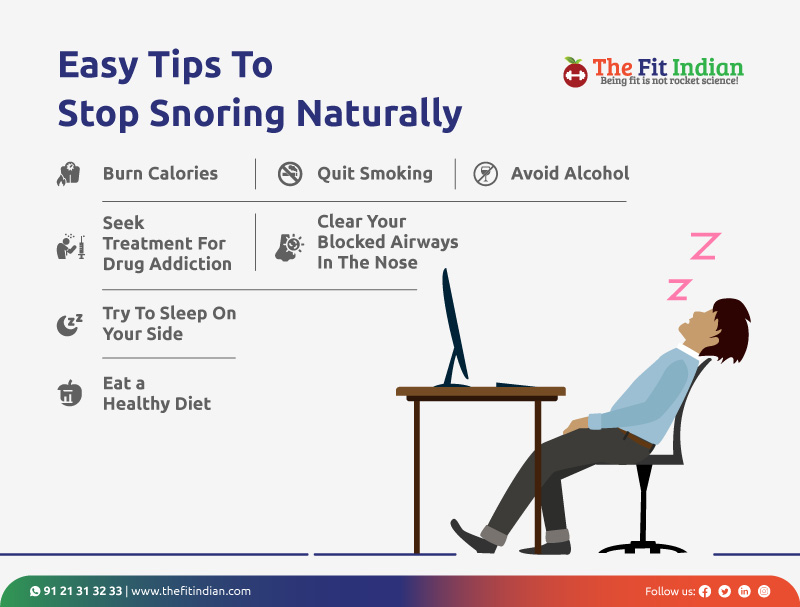Why Do Fat People Snore? Is Obesity And Snoring Interconnected with Health Complications
Reviewed by: Dr. T S Deepthi Sarojini | Author: Manoja Kalakanti
Waking up at midnight to hear someone snoring loudly next to you isn’t ideal. Many snorers end up waking themselves up depending on how loud they are. Sometimes you try to sleep again, and other times you persuade them to switch to the quieter side. Severe snoring can disrupt your sleep and cause you to wake up frequently and unexpectedly. Various factors can affect snoring causes, including infections such as the common cold or an anatomical deformity in the nose or throat.

Snoring is one of the prevalent causes of sleep deprivation. While snoring is not necessarily harmful to your health, doing so regularly can impact your bed partner’s sleep quality. But do you know the reasons for snoring and what snoring could mean for your health? Read on to know the reason behind snoring.
Why Do People Snore
Snoring is a harsh sound made when a person’s breathing becomes obstructed while sleeping. The most common cause of snoring is excessive relaxation of the muscles in and around the throat while we sleep. It occurs when the tissues in your throat sag, narrowing the airway. The uvula and soft palate will vibrate as the pressure in the back of the throat rises. These vibrations produce the sound of snoring.

Fortunately, there are numerous snoring remedies available to help alleviate symptoms. Now, let us see what the leading causes of snoring are.
Causes Of Snoring
Various reasons can cause snoring. These factors include alcohol consumption and weight, which may be under your control. Other snoring causes, such as the anatomy of your mouth and sinuses, may be beyond your control.

Other reasons why people snore while sleeping include
1. Age
As you get older, your muscle tone declines, you may gain weight due to hormonal changes, and your throat may narrow.
2. Being Obese
One of the significant causes of snoring is obesity. You are more likely to snore if your Body Mass Index (BMI) is high. Living a healthy lifestyle, proper nutrition, sleeping, and waking up early will help maintain your body weight and reduce snoring.
3. Blocked Nose
Changes in climate and pollution are frequently the primary causes of a blocked nose or congestion caused by a cold or allergy. This, in turn, makes breathing difficult, creating a vacuum in the throat and allowing snoring to occur.
4. Smoking, Alcohol And Drugs
Smoking and drinking alcohol cause the throat and upper airway muscles to relax, resulting in breathing problems and, eventually, snoring. Some drugs and medications, which cause excessive muscle relaxation, can also cause snoring.
5. Sleep Posture
When you sleep on your back, your throat relaxes, and your tongue blocks your airway. Resting on your side or elevating your head by 4 inches may be enough to stop snoring.
6. A Dry Environment
A dry environment can cause nosebleeds and irritate the nose. This can cause people to snore because they breathe through their mouths.
7. Sleeping On Your Stomach
When you sleep on your back, your muscles and tongue are much more prone to falling back of your throat, obstructing your airway and causing snoring, especially if you breathe through your mouth.
Others may snore due to a chronic health condition called sleep apnea. To effectively treat snorers, it is critical to distinguish between the two.
How Does Being Overweight Make You Snore?
You hear a lot about the relationship between body weight and snoring. Does being overweight cause snoring? Snoring occurs when fat piles up in certain parts of our bodies. However, it is necessary to note that body fat accumulation is not the only cause of snoring. Other factors can also contribute to it.

Fat around the neck and throat can obstruct the upper airway, mainly if you’re lying down. This obstructs normal airflow, causing the throat tissues to vibrate. As a result, snoring occurs. Not only can fat around the neck and throat cause snoring, but fat around the midriff can.
Excess chest fat compresses the rib cage. The pressure that belly fat exerts on the diaphragm causes it to rise.
Any reduction in lung capacity reduces airflow, making it more difficult for the throat to maintain its shape. The minor collapse of throat tissue causes snoring as a result of this.
Tips To Stop Snoring

Suppose you or your partner snores only occasionally or mildly and wakes up feeling refreshed and able to work usually during the day. In that case, try the following behavioral changes to alleviate your snoring problem.
- Reduce your alcohol consumption
- Seek treatment for your drug addiction
- Quit smoking
- Avoid eating too close to bedtime
- Try to burn calories and eat a healthy diet
- Clear your airways before bed if you have a cold or the flu
- Pillows should be placed behind you to keep your head raised and reduce blockage
- Try sleeping on your side.
Home Remedies And Exercises To Stop Snoring
Snoring is normal occasionally. It occurs when air cannot pass smoothly through your throat or nose while sleeping. On the other hand, snoring can hurt your health if it happens regularly. Sleep deprivation can also impair your judgment, reasoning abilities, and mood.

So, do you want your snoring to stop? Try these home remedies and throat exercises to prevent snoring that can improve your throat muscles.
Chin Presses
Weak throat muscles can cause snoring. Chin presses will help you strengthen your throat muscle.
- Place your finger on your chin and press it back and down, and your chin should be slightly tucked
- Stay in this position for the next few seconds before relaxing
- During this exercise, you should feel the side muscles of your neck tense up
- Repeat this process several times before going to bed
Practice Singing Every Day
Snoring can occur if your throat muscles are overly relaxed. Sing your heart out to tone your throat. This exercise causes you to widen your throat and open your mouth wide and helps you control your throat and soft palate muscles. It can also prevent your throat muscles from collapsing during sleep.
Vocal Exercises
Vocal exercises can help strengthen your vocal cords and your neck and throat muscles. It assists in toning the muscles in your throat.
- Slowly and deliberately pronounce the vowel sounds a-e-i-o-u
- Begin by stretching out the sounds and saying them slowly
- Then, say the sounds quickly
- You can try each vowel in different combinations or repeat each vowel several times in a row.
Sliding Of The Tongue
Curling and sliding exercises will strengthen the muscles at the base of the neck and throat.
- Extend your tongue and open your mouth
- Then, with the tip of the tongue facing up, rotate it
- Make sure the tip of the tongue touches the palate or the roof of the mouth
- Then, slide it towards the back or through the mouth
Roar
- Make the facial expression of a tiger about to roar to strengthen the muscles
- Extend your mouth as far as you can
- Stick your tongue downward as far as it will go
- You should feel the uvula, flesh in the back of your throat, lift upwards
- Use the mirror to see the position of your uvula
- Lift your uvula for 5 seconds, then relax
- Repeat this process ten times
Ginger and Honey Tea
The most common household item is ginger. Ginger increases saliva secretion, soothing the throat and alleviating snoring. It is a superfood that can treat almost anything, including stomach upset, weight loss, heart problems, and common cough and cold.
Green Tea
Green tea, a good source of antioxidants and active ingredients, is one of the best snoring remedies. It relaxes the muscles of your nose and throat, reducing vibrations that cause loud snoring. It can help adults with snoring and sleep apnea.
How should it be used?
- Boil a glass of water
- Pour it over the green tea infusion or add a teabag
- Leave it for 5 minutes
- Drink it before going to bed.
Soy Milk
You might be surprised to learn that dairy products can cause snoring by increasing phlegm. This occurs because specific proteins in cow milk can cause mild to severe allergic reactions, causing congestion, closing the nasal passages, and increasing snoring. To get relief, replace cow milk with soy milk or nondairy milk.
Olive oil
Sipping some extra virgin olive oil before bedtime can also help to smooth out the airways. It also keeps your throat muscles from blocking your throat while you sleep.
Cardamom
Cardamom is an effective spice for clearing blocked nasal passages and reducing congestion, which leads to less snoring. Add 1/2 teaspoon cardamom powder to a glass of warm water 30 minutes before bed.
So, these were some snoring remedies and exercises that can be quickly done at home to provide immediate relief from loud snoring noises.
Our Take
If you are overweight and snore, you may be stuck in a complex cycle to break. You can start losing weight, stop snoring, and gain more with effective weight loss techniques, well-suited snoring remedies, and good sleep hygiene.
FAQ’s
1. What causes snoring?
Snoring is primarily caused by loose tissue or a partially blocked airway, which causes you to snore as you breathe.
2. How to stop snoring?
The first way to stop snoring is to change your sleeping position. Alcohol, sleeping pills, and sedatives should be avoided because they relax the muscles in the throat and make breathing difficult.
3. How to stop snoring naturally?
Eating a large and heavy dinner is one of the primary causes of snoring, so if you want to stop snoring or significantly reduce its frequency, avoid eating large meals and go to bed right away.
4. How to control snoring?
You can control your snores by keeping your body in shape, exercising regularly, and eating a healthy diet.
5. How to stop snoring permanently?
If you’re overweight, lose weight, sleep on your side, raise the head of your bed, and by using nasal strips or an external nasal dilator, you can stop snoring permanently.
6. How to stop snoring woman?
Women can naturally stop snoring by changing their sleeping habits, staying hydrated, making lifestyle changes, and performing anti-snoring exercises.
7. Is snoring good or bad?
Snoring occasionally isn’t usually a big deal. However, if you snore regularly, you not only disrupt the sleep patterns of those around you but also harm your sleep quality. Snoring can be a symptom of a medical condition such as obstructive sleep apnea.
8. Is snoring dangerous?
Snoring causes more harm than just keeping your partner up at night. It also raises the chances of having a stroke or contracting another disease.
9. What to eat to stop snoring?
Eating fish rather than red meats can help you stop snoring. This is because all red meat and saturated fats can cause spasms that cause inflammation in the nasal passages, so it not only improves sleep quality.
10. What causes snoring in males?
Smoking and drinking alcohol before bedtime are common causes of snoring because they relax the muscles around your airways, causing louder and more audible vibrations.




Manoja Kalakanti